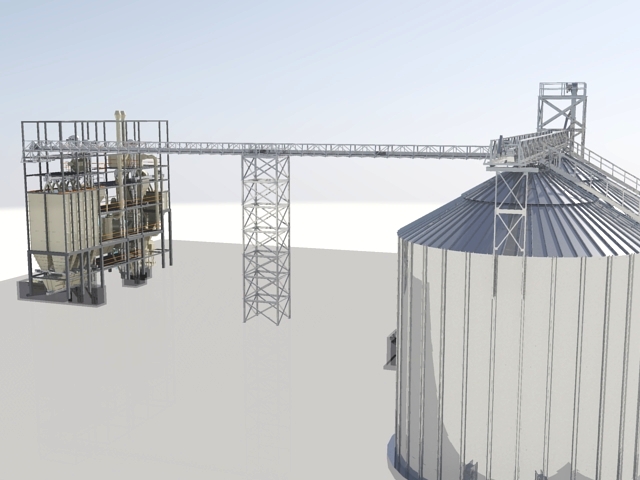Professional feed mill design services offer numerous advantages to stakeholders in the feed industry. From ensuring efficient production to meeting safety standards, these services play a crucial role in the success of feed mill operations. Let’s explore some key benefits of utilizing professional feed mill design services.
Key benefits of acquiring feed mill design services
1. Optimized production efficiency
Feed mill design services are instrumental in optimizing production efficiency. By engaging the expertise of professionals in the field, feed mills can be designed to maximize output while minimizing operational costs. This is achieved through the strategic layout of the mill, efficient equipment selection, and workflow optimization. The result is streamlined processes and enhanced productivity, ultimately contributing to better profitability for feed mill operators. Production efficiency is crucial for maintaining a competitive edge in the industry, and design services play a pivotal role in achieving this goal.
2. Compliance with industry standards
Designing a feed mill that complies with industry regulations and safety standards is non-negotiable. Expert feed mill designers prioritize adherence to various regulations and standards set forth by governing bodies. This includes considerations for food safety, environmental regulations, and workplace safety. By ensuring that the facility meets all necessary requirements for safe and compliant operation, exceptional design services mitigate regulatory risks and create a foundation for sustainable and responsible feed production.
3. Customized solutions
Every feed mill has unique requirements based on the type of feed being produced and the scale of operation. Design services provide tailored solutions that address the specific needs of the client. This customization encompasses factors such as feed composition, production volume, and specialized processing requirements. By designing the feed mill to handle the particular demands of the operation, specialized design services contribute to optimized performance and output. Customization also allows for scalability, enabling feed mills to adapt to evolving market demands and production needs.
4. Integration of advanced technologies
Staying abreast of the latest innovations is essential in the dynamic landscape of feed milling technologies. Feed mill design service providers incorporate state-of-the-art technologies into the feed mill design, enabling automation, process control systems, and other advanced features that enhance efficiency and quality. This integration of advanced technologies not only improves production processes but also positions feed mills at the forefront of innovation, allowing them to meet evolving consumer demands for high-quality and sustainable feed products.
5. Enhanced safety measures
Safety is paramount in any industrial operation, and feed milling is no exception. Feel mill design experts focus on integrating safety measures into the feed mill layout to create a safe working environment for personnel. This includes considerations for equipment safety, ergonomics, and hazard prevention. By ensuring compliance with safety regulations and industry best practices, outstanding design services prioritize the well-being of workers and mitigate the risk of accidents or workplace hazards.
6. Cost-effective design solutions
Specialized feed mill design services are dedicated to delivering cost-effective solutions that optimize operational expenses while maximizing output. This is achieved through efficient layout planning, equipment selection, and energy management strategies. By minimizing waste, reducing energy consumption, and streamlining operational processes, these services contribute to long-term cost savings. Cost-effective design solutions are essential for maintaining competitiveness in the feed industry, especially in the face of fluctuating raw material prices and market dynamics.
7. Expert consultation and support
Engaging bespoke feed mill design services provides access to expert consultation and ongoing support throughout the design and implementation process. This ensures that the feed mill is built to the highest standards and that any challenges are addressed with the support of experienced professionals. From initial concept development to post-construction support, expert consultation and guidance contribute to the successful realization of feed mill projects. This support also extends to operational optimization and troubleshooting, providing valuable assistance in maximizing the feed mill’s efficiency and performance.
Additional tips when hiring feed mill design services
-
Check references and reviews.
Look for testimonials, case studies, or reviews from past clients. This will give you insights into the firm’s track record and customer satisfaction.
-
Evaluate experience in feed mill design.
Experience in designing feed mills specifically is crucial. Ask about their previous projects in the industry and how they handled challenges unique to feed mill design.
-
Assess technical expertise.
Ensure the firm has engineers and designers with expertise in feed mill equipment, processes, and regulatory requirements. This ensures they can deliver a design that is efficient, compliant and meets your operational needs.
-
Determine how innovative the provider is.
Seek out firms that offer innovative solutions and stay updated with industry trends. This can lead to more efficient designs and cost-effective solutions for your feed mill.
-
Evaluate project management capabilities
Ask about their project management process. A well-organized firm with clear timelines and milestones can help ensure your project stays on track and within budget.
-
Ensure customization and flexibility.
Every feed mill operation is unique. Ensure the firm can tailor their design to fit your specific requirements and operational constraints.
-
Determine their communication and collaboration strategies.
Clear communication is key to a successful project. Ensure there is a designated point of contact and that the firm is responsive to your questions and concerns throughout the design process.
-
Make sure they are compliant.
Feed mills must adhere to various industry standards and regulations. Ensure the design firm is knowledgeable about these requirements and can ensure compliance.
-
Ensure transparency.
Clarify the cost structure upfront and ensure no hidden fees. A reputable firm will provide a detailed breakdown of costs and help you understand where your money is going.
-
Ask about post-design support.
Inquire about post-design support and services such as commissioning assistance, training, and ongoing maintenance recommendations.
These additional tips can help you make a more informed decision when hiring a feed mill design provider, ensuring a smoother and more successful project outcome.
In conclusion, the benefits of exceptional feed mill design services are multifaceted, encompassing efficiency, compliance, customization, safety, cost-effectiveness, and expert support. By leveraging these services, feed mill operators can position their operations for success in an increasingly competitive industry.

